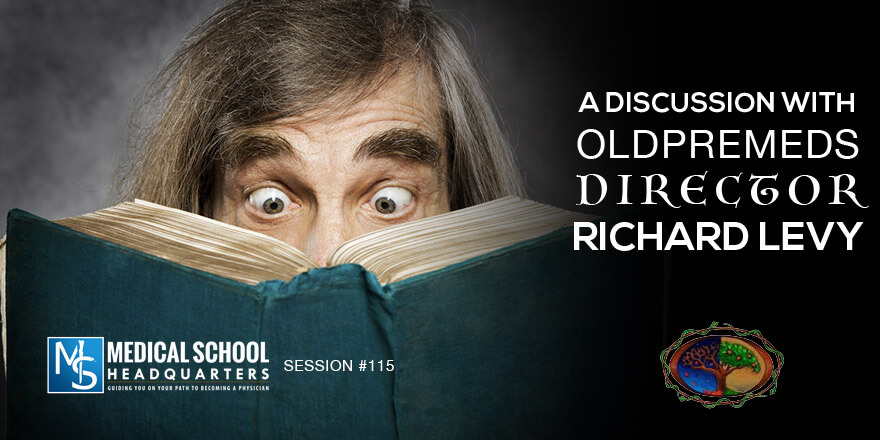You still have time to sign up with one of our amazing expert advisors! Learn More!

This week I’m bringing back Richard Levy. He is the Executive Director of the National Society for Nontraditional Premedical and Medical Students, better known as OldPremeds.
Rich is the go-to guy for nontraditional students, which I know comprise a large majority of you listening right now. In this episode, Rich talks about what’s going in the nontraditional premed world and health care in general. He shares his advice to those who might want to pursue the medical path as a nontraditional student, how to start, and where to find advisors.
Listen to this podcast episode with the player above, or keep reading for the highlights and takeaway points.
[Related episode: Interview with OldPreMeds Publisher Richard Levy.]
A big driving force in this expansion has been the American Medical Association’s push for new GME spots and spots in medical school. We have a looming physician shortage estimated at 130,000 physicians in 15-20 years.
We have a looming physician shortage estimated at 130,000 physicians in 15-20 years.Click To Tweet[Related episode: Interview with a 56-year-old Medical Student.]
Most traditional premed students don’t deal with as many big events outside of school, but older students deal more with marriages, mortgages, kids, etc.
[Related episode: How to Provide for Your Family as a Premed.]
[Related episode: How to Pay Back Your Medical School Loans.]
[Related episode: Should I Meet with Admissions Committees Before I Apply?]

Lorem ipsum dolor sit amet, consectetur adipiscing elit
I just received my admission to XXXXX! This is unreal and almost feels like I am dreaming. I want to thank you for all of your help with my application. I cannot overstate how influential your guidance and insight have been with this result and I am eternally grateful for your support!
IM SO HAPPY!!!! THANK YOU SO MUCH FOR ALL YOUR HELP, IM INDEBTED TO YOU! Truly, thank you so much for all your help. Thank you doesnt do enough.
I want to take a few moments and thank you for all of your very instructive, kind and consistent feedback and support through my applications and it is your wishes, feedback, and most importantly your blessings that have landed me the acceptance!
I got into XXXXX this morning!!!! It still has not hit me that I will be a doctor now!! Thank you for all your help, your words and motivation have brought me to this point.
I wanted to once again express my heartfelt gratitude for your help in providing feedback during my secondary applications. Your guidance has been instrumental in my journey.
Just wanted to share my wonderful news! I received my first medical school acceptance! Thank you for all that you do for us Application Academy!!!
I am excited to tell you that I just got my third interview invite from XXXXX today! I can’t believe it. I didn’t even know if I was good enough to get one, let alone three – by mid-September. Thank you so much for all of your help and support up to this point; I would not be in this position without it!!
I wanted to thank you for helping me prepare for my XXXXX interview. Even in a 30-minute advising session, I learned so much from you. Thank you for believing in me, and here’s to another potential success story from one of your advisees!
I just received an acceptance with XXXXX! This is so exciting and such a huge relief and so nice to have one of our top choice schools! I also received an interview with XXXXX which brings the total up to 20 interviews! Thank so much, none of this would have been possible without you!

Join our newsletter to stay up to date
* By subscribing you agree to with our Privacy Policy and provide consent to receive updates from our company.
Resources
Advising Services
Podcasts & Youtube
Books
About
Deal Lasts for

"*" indicates required fields